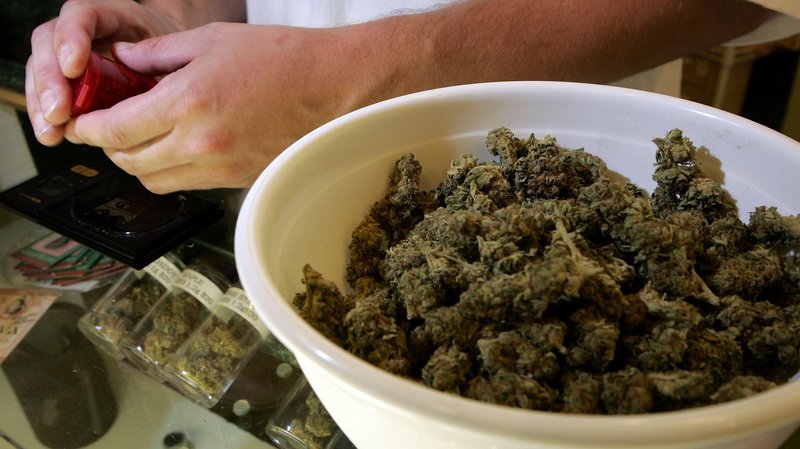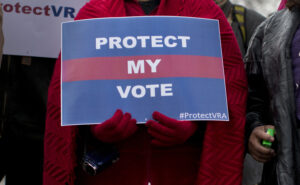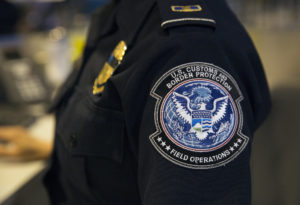‘The Just Thing to Do’: San Francisco to Erase Marijuana Convictions
The decision is a result of California's 2016 vote to legalize the drug for recreational use. A worker packages medical marijuana in San Francisco in 2006. (Justin Sullivan / Getty Images)
A worker packages medical marijuana in San Francisco in 2006. (Justin Sullivan / Getty Images)
San Francisco will retroactively apply California’s new marijuana legalization laws to thousands of past criminal cases. At a news conference Wednesday, San Francisco District Attorney George Gascón announced that the city will clear misdemeanor marijuana convictions from the records of nearly 3,000 people, and will re-sentence defendants in more than 4,000 marijuana-related felony cases.
The decision is a result of California’s 2016 vote to legalize marijuana for recreational use. One aspect of the law, which was called Proposition 64 on the ballot, is that people convicted of marijuana-related crimes while the drug was illegal can petition the courts to have their convictions cleared under current law. San Francisco’s decision to wipe out convictions essentially removes from the individual the burden of petitioning the court. The city will be clearing convictions dating back to 1975, according to Gascón, who added, “Instead of waiting for people to petition—for the community to come out—we have decided that we will do so ourselves. We believe it is the right thing to do. We believe it is the just thing to do.”
Advocates for poor and minority communities have long cited the disproportionate number of arrests of people of color for drug possession. In 2013, an American Civil Liberties Union report found that a disproportionately high number of the 8 million marijuana-related arrests in the U.S. from 2001 to 2010 involved black Americans. While both black people and white people were found to use marijuana at approximately the same rate, black people were 3.73 times more likely to be arrested for possession. The ACLU also found that 52 percent of all drug-related arrests in 2010 were for marijuana, and that more than 700 out of every 100,000 black Americans were arrested for marijuana possession.
The Rev. Amos Brown, president of the San Francisco chapter of the NAACP, who also spoke at the news conference, said, “This is a giant step for justice. And it is a step toward setting black people free to live in the community, to have jobs, to have health care, to have a decent education, and we just need to keep this good thing a-rollin’. ”
Gascón said he hopes the San Francisco decision will prompt other elected officials to follow suit. The city of San Diego has since announced that it will apply legalization laws to forgive old marijuana convictions, and Los Angeles has already introduced a marijuana ”social equity” program that gives marijuana business licensing priority to those in communities that were especially affected by the “war on drugs.”
The L.A. Daily News reports:
Under this program, cannabis business operators that meet the “social equity” criteria would be moved to the front of the line for license applications. Such businesses would need to meet criteria such as have low income status, a cannabis-related conviction or being located in an area that has had a high number of cannabis-related arrests.
For retail cannabis licenses, the city would process the applications of two social equity operators for each general operator. With non-retail operators like cultivators and manufacturers, the ratio is one for one.
“Our social-equity program—and I say this without fear of contradiction—is the most aggressive and the most progressive and the most just program that anyone anywhere in the United States have here in America,” Los Angeles City Councilman Marqueece Harris-Dawson said.
“It is 84 years and one day since the United States instituted prohibition on alcohol, cannabis and a host of other drugs,” he said. “The express purpose of those policies was to control unruly Negro men in the South.”
“In 1970, Richard Nixon expanded and instituted what we referred to as the War on Drugs to control the Black Panther party, activists, blacks and anti-war hippies,” he said. “And cities and states across the country have been doing that, carrying out that policy, sometimes knowingly and sometimes unknowingly.”
Los Angeles Councilman Herb Wesson added that the program is an attempt to make reparations. “Social equity is about trying to correct a wrong,” he said.
Your support matters…Independent journalism is under threat and overshadowed by heavily funded mainstream media.
You can help level the playing field. Become a member.
Your tax-deductible contribution keeps us digging beneath the headlines to give you thought-provoking, investigative reporting and analysis that unearths what's really happening- without compromise.
Give today to support our courageous, independent journalists.






You need to be a supporter to comment.
There are currently no responses to this article.
Be the first to respond.